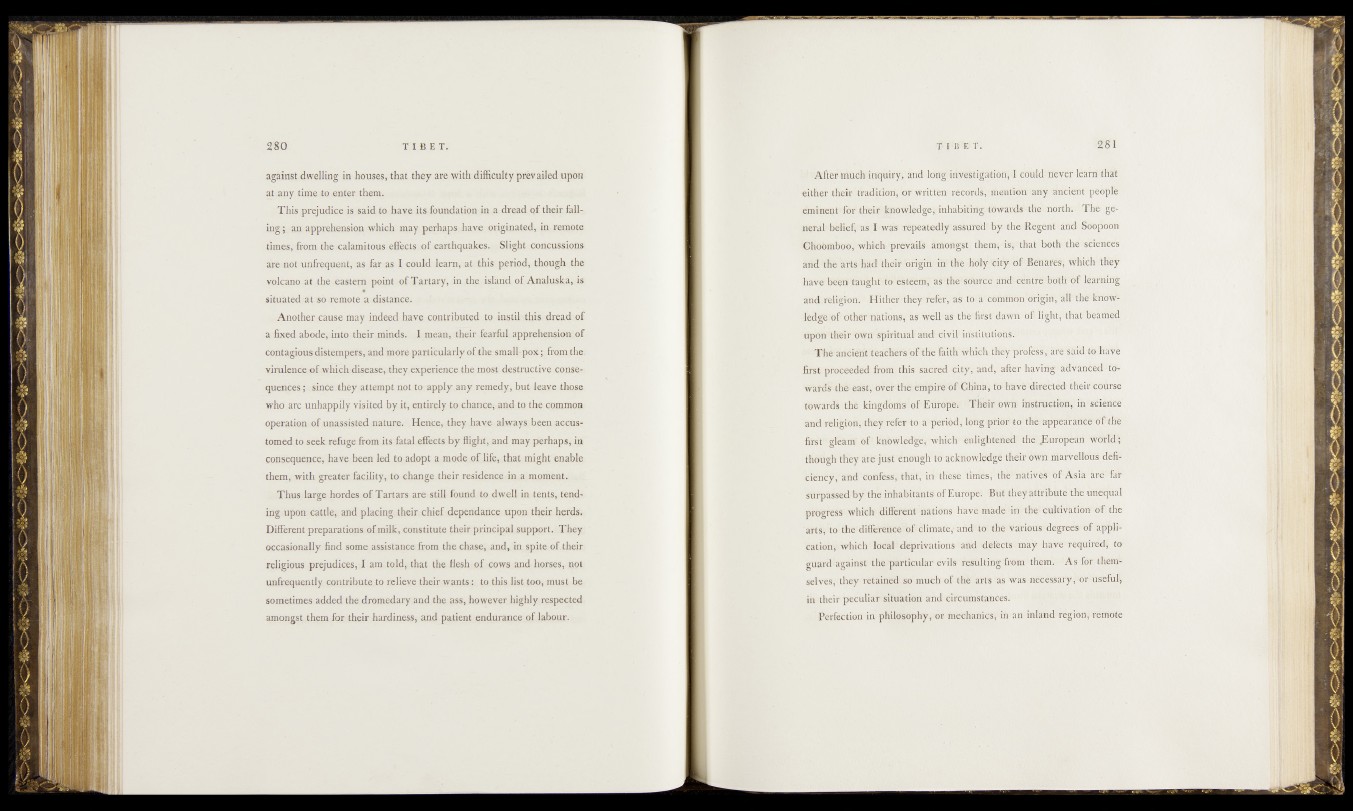
against dwelling in houses, that they are with difficulty prevailed upon
at any time :to enter them.
This prejudice is said to have its foundation in a dread qf their falling;
a® apprehension which may pef^psihave originated, » rosilte
tunes, from the.calamitous effects of -earthquakes. Slight coricussiqh&
are not unfrequent, as far as I could, learn, at this period, though .the
volcano at theieastern point of Tartary, in .the island of Analusku, is
situated at -so remote a.distance. 4
Another cause may indeed have contributed to instil »this dread of
a fixed abode, into their minds. I mean, their fearfuLapprehension^ol
contagious distempers, and more particularly of the small-pox ;Jröm the
virulenGe.of .which disease,.they experience the most destructive cö'öSOt-
quences; since they attempt not to apply any remedy, but leaye those
who are unhappily visited by it, entirely to chance, and to the common
operation of unassisted nature. Hence, they have always been accus-
tomed to seek refuge from its fatal effects by flight, and may perhaps, in
consequence, have been led to adopt a mode.of life,„that, might enable,
them, with greater facility, to change their residence -in. a, moment.
Thus large hordes of Tartars are still found to dwell in tents, tend-:
ing upon cattle* apd placing their chief dependance upon their herds.
Different preparations of milk, constitute their principal support. They
occasionally find some assistance from the chase; and„tn, spite, of .their;
religious prejudices, J am told, that the flesh of cows and horses, not
unfrequently contribute to relieve their w an tsto this list too, must be
sometimes added the dromedary and the ass, however highly respected
amongst.,them for their hardiness, and patient endurance of labour.
bi 'AfteBirïüâh'-inquiry, and I d f i g lmVe - s d CouM-rfever learn' that
either their tradition, ’or written«'re'chids,-. iheutfe'rittWy «anient people
eminent’for theift'iknowledgegiisha’b|?fetg>tidvSiai'dsi<bhebnoi'ttes'>'Th& gef-
•-neraM^HelMOs I was rèpeatedfyassuïedî b'y’t'hëdlegént laüd'SoOpéèh
-€Sîôbmbo'o, whiôh 'prevails aËèMgS&i thferHp^^tfeah.both the-'sëiehcès
âfîd UÊb hrts 'ËSd’ their origin ih.Éiïe -IMy %it|y-!df«jBehare.h wM<sb4hey
ha-v#Wçîï taughft^ê^teenî^yè^the^so^it® ÉrieKéehfr箩f learning
andjreli'gro’®3 HitRer*'thëÿ:refeï, as to‘^fce«fhhuTOi^iri';!MFth^knowledge
’of«dthé'trinatfons, as welbas 1 i\\Ti ohlnjit' *thu beuned
’■ dpoh tKeir own spiritual and ciV l Nil's,fi t u t '
arntî^ê^kricMft^tfeaëhefk^pf the faith which
first proceeded-from this Sacred cit-y, a n d h a vitÿll?d^â'neëdJ
wards* thc*east, over the empire of Ciifna, to have directed’ tliur’cotise
towards the’ kingdbiri of*®# opeV *lEJ^ir -bWn1 &'stfuctib% ftjj^içgjfe'.
and religiôftyth'eÿ refer to a‘perio<i,>
first'* gleam? of knbwled^f^whîh^enl^fifeAeu^ïHéiJBurcffêdh VoTlcEh
though they are just 'dndiigh to' acknowledge theiS'o^h'mar^elfei^.tfeflf«
ciency, and donfess, thàt, irl'thèsè "time's,thefehii^ês^Ô^Asia‘lai^fA'
»passed by the’ inhabitants of Europe?
progress' which different nations h'aV& made in thyoùfrivàriO^of the
'arts', to;the difference ofeèlilWâte,» and''loathe *slaldÔ’tiSvdegreeS'‘of application;
which local1 deprivations ‘and «dttfects-'ma^ tevéfféq*6#éd$ to-
guard against the particular evils reSitl ting-'fréta11 t-hem * A S doit them4-
selves, they retained so much of the arts as rÿas ‘fi^fee^ar^w-us'efug
in-their peculiar situation and ©iFctimStanCes.'''*
'’Perfection in phildsôph'y,;®* fnehhaMds^in an 'Mridd^MgfenV¥erfft>fe